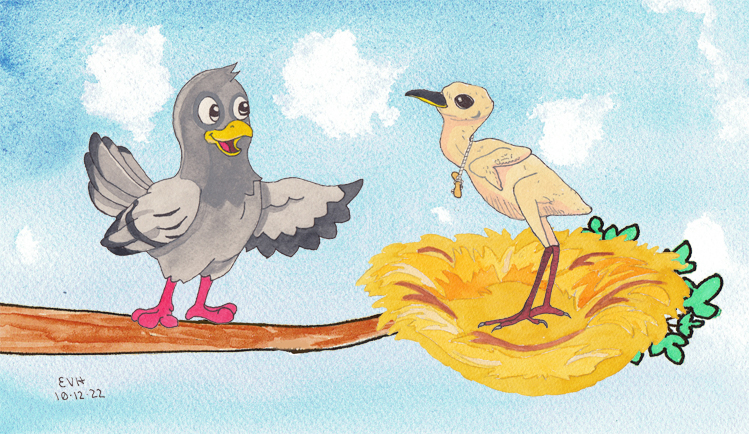
Jataka 375
Kapota Jātaka
The Pigeon
as told by Eric Van Horn
originally translated by H.T. Francis and R.A. Neil, Cambridge University
originally edited by Professor Edward Byles Cowell, Cambridge University
This is the third in the greedy crow series. The other two versions are mentioned in the text. In this version, the companion pigeon is not shy about mocking his greedy neighbor!
“I feel quite well.” The Master told this story while he was living at Jetavana. It is about a greedy monk. This story of the greedy monk has already been fully told in a number of ways (see Jātakas 42 and 274). In this case the Master asked him if he were greedy. When he confessed that it was so, the Master said, “Not now only, but formerly also, brother, you were greedy, and through greed you came by your death.” And with that he told this story from the past.
Once upon a time during the reign of Brahmadatta, King of Benares, the Bodhisatta was reborn as a young pigeon. He lived in a wicker cage in the kitchen of a rich merchant of Benares.
Now a crow hungered for fish and flesh. He friends with this pigeon, and he lived in the same place. One day he saw a lot of fish and meat and thought, “I’ll have this to eat.” So he lay loudly groaning in the cage. When the pigeon said, “Come, my friend, let us go out for our food,” he refused to go, saying, “I have terrible indigestion. You go.” And after the pigeon left, he said, “My troublesome enemy is off.” Then he repeated the first stanza:
I feel quite well and at my ease,
Since Mr. Pigeon off is gone.
My cravings I will now appease.
Choice herbs and meat should strengthen one.
When the cook who was roasting the fish and meat came out of the kitchen—wiping away streams of sweat from his brow—the crow hopped out of his basket and hid in a basin of spices. But when he did that, the basin gave a “click” sound. The cook came in haste. He seized the crow, pulling out his feathers. The cook ground some moist ginger and white mustard together. He pounded it with a rotten date, and smeared him all over with it. He rubbed it on with a potsherd, wounding the bird. Then he fastened the potsherd on his neck with a string, threw him back into the basket, and went off.
When the pigeon came back and saw him he said, “Who is this crane lying in my friend’s basket? The crow is a hot-tempered fellow and will kill this stranger.” And jesting, he spoke the second stanza:
“Child of the Clouds,” with tufted crest,
Why did you steal my poor friend’s nest?
Come here, Sir Crane. My friend the crow
Has a hot temper, you must know.
(“Child of the Clouds” refers to the mythological belief that cranes are conceived at the sound of thunder clouds.)
The crow, on hearing this, uttered the third stanza:
Well may you laugh at such a sight,
For I am in a sorry plight.
The cook has plucked and basted me
With rotten dates and spicery.

Figure: The pigeon mocks the greedy crow
The pigeon, still making sport of him, repeated the fourth stanza:
Bathed and anointed well, I think,
You have your fill of food and drink.
Your neck so bright with jewel sheen,
Have you, friend, to Benares been?
Then the crow repeated the fifth stanza:
Let not my friend or bitterest foe
On visit to Benares go.
They plucked me bare and as a jest
Have tied a potsherd on my breast.
The pigeon hearing this repeated the final stanza:
These evil habits to outgrow
Is hard with such a nature, crow.
Birds should be careful to avoid
The food they see by man enjoyed.
After thus reproving him, the pigeon no longer lived there. He spread his wings and flew elsewhere. But the crow died then and there.
The Master here ended his lesson. He taught the Four Noble Truths, at the conclusion of which the monk attained stream-entry. Then the Master identified the Birth: “At that time the crow was the greedy monk, and I was the pigeon.”
